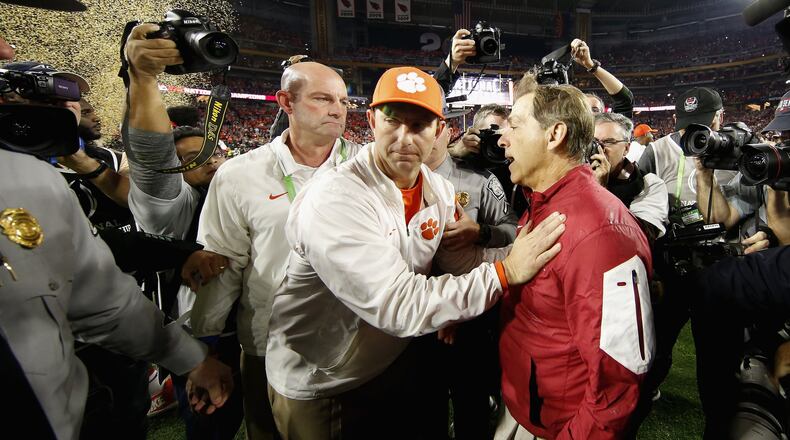The national championship game was to be played Monday night. Before it began, we wondered about a matter of national importance, at least as it pertains to sports: Did college football need Alabama to lose?
This was the third run for the College Football Playoff, which many/most of us awaited for decades. Alabama has been the No. 1 seed twice and the No. 2 last year. It didn’t win the inaugural CFP: It was upset by Ohio State in an epic Sugar Bowl semifinal. Last year Alabama beat Clemson in the title game. This time the Crimson Tide was favored to repeat the feat.
Looking beyond the CFP, we note that Alabama won three of the final five BCS national titles. Since the Associated Press poll came into being in the 1930s, no school has ever won five more-or-less consensus national championships in eight years. Among other things, that bit of history – more than a bit, actually – was at play Monday night.
Playoff No. 1 made its debut to better-than-anticipated TV ratings that left network executives and CFP folks downright giddy. (“This thing really works!”) Last year’s semifinals yielded tepid games and roundly disappointing ratings. This year’s semis did better ratings-wise but were decided by an aggregate score of 55-7.
The first CFP staged its semis on New Year’s Day. The second and third played their opening rounds on New Year’s Eve. That’s a big difference, so big that CFP chief Bill Hancock – who once vowed his operation wouldn’t budge from its scheduled dates – has already changed its semifinals for 2018, 2019, 2024 and 2025. (As much as people might like college football, they love their New Year’s Eve parties.)
The championship game suffers from no New Year’s tangle. It’s played on a Monday. The first CFP title game matched Ohio State against Oregon; the Buckeyes won 42-20. The second matched Bama and Clemson, the Tide prevailing 45-40. The first drew 33.4 million viewers, the second 23.6. That was a drop of nearly 10 million sets of eyeballs for what was demonstrably a superior game.
The BCS title game of January 2012 pairing Alabama with LSU drew the third-lowest TV audience in BCS annals. That game, featuring teams from the same conference, led other conferences, the Big Ten especially, to revisit any opposition to a playoff. We saw with Alabama-LSU then, and with Alabama-Clemson last year, something we didn’t see with the final BCS title game, which matched Florida State against Auburn – two other Southern schools – in January 2014. That drew the third-highest ratings in the BCS’ 16-year existence.
Alabama is a great program – on this we can all agree – but not necessarily a great draw. Some of that has to do with demographics: Not as many people live in Alabama as in, say, Florida, to say nothing of California or New York. No matter how much ESPN might like it, there’s not apt to be a USC-Syracuse championship game anytime soon. But what we’re seeing goes beyond geography. It’s human nature. Alabama has simply won too much. We need a Sabin vaccine to inoculate us against Saban fatigue.
Apologies for using this comparison for a second consecutive day, but Alabama’s dominance reminds me of nothing so much as UCLA’s run of 10 NCAA titles in 12 seasons. The Bruins became the platinum standard for college basketball at a time when the sport was a regional entity. The famous game of Jan. 20, 1968 – No. 1 UCLA and Lew Alcindor against No. 2 Houston and Elvin Hayes in the Astrodome, televised nationally by TVS – will stand forever in sports history.
UCLA won so often – four more consecutive titles after Lew/Kareem left for the NBA – that it became synonymous with the sport itself. People who didn’t care much for college basketball knew UCLA. But for the NCAA tournament to flower into the Madness we see to this day, UCLA needed to lose. Which, in double overtime in March 1974 against North Carolina State in Greensboro, N.C., it finally did. The giant Bill Walton was felled by David Thompson.
That wasn’t quite UCLA’s final act – sans Walton, the Bruins won the NCAA again in 1975, whereupon John Wooden retired – but it was the end of college basketball as a one-program sport. Saban’s Alabama is the closest thing to Wooden’s UCLA we’ve seen. Clemson has lost two games in two seasons and is clearly the second-best team in the land, but if the Tigers prevailed Monday the game will surely be remembered mostly as the time Alabama finally lost.
About the Author
Keep Reading
The Latest
Featured



